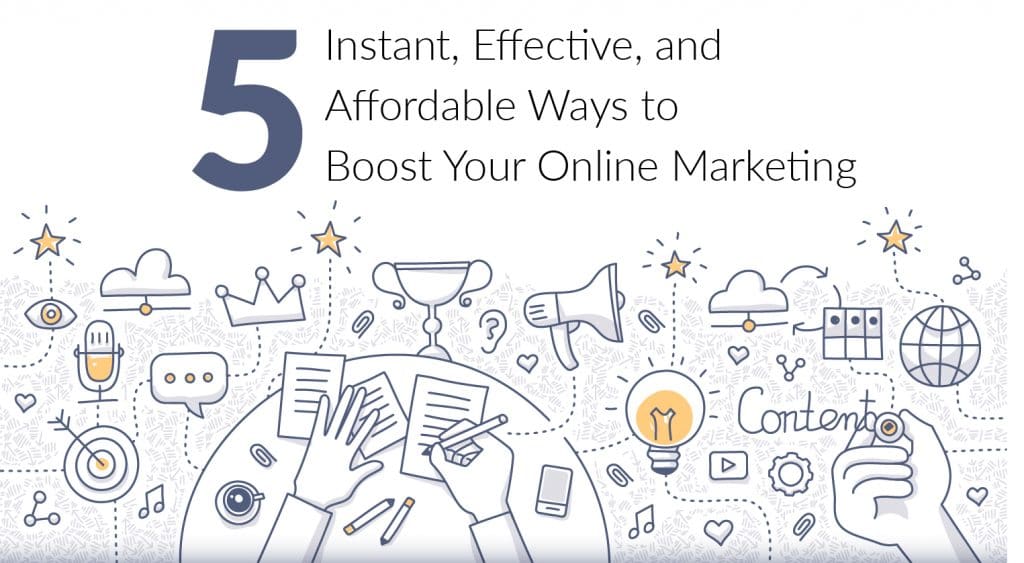Contrary to popular belief – and what some of our competitors might tell you – getting better online marketing results doesn’t have to involve designing and launching a brand-new website.
There are times when you should take that step, of course, but it can sometimes be just as smart (and a whole lot more cost-effective) to make small and immediate improvements to the website you have. For some business owners and managers, making inexpensive tweaks might be the only choice if budgets are tight.
A lot of web designers don’t like to admit this, but there are little things you can do to boost the effectiveness of your online marketing campaigns that don’t require a lot in terms of effort or money. They won’t save you if you have a bad website, but they can go a long way towards helping you get more returns from a good one that just has a few issues.
To put it a different way, sometimes it’s better to put new tires and a fresh windshield on the car you have rather than trading it in at the dealership. The same thing can apply to business web design. Making a huge investment into a brand-new layout isn’t always the answer, particularly in the short term.
With that in mind, let’s look at five effective, affordable, and nearly-instant ways you can boost your online marketing results…
 #1 Audit Your Business Website
#1 Audit Your Business Website
Imagine if you could have a simple report that told you exactly what was going on with your business website at any time. It would give you statistics about visitors and traffic sources, along with insights into which pages and content categories were most popular. It would also evaluate technical factors like web page loading speed, quality of your internal links, and even your current search engine positioning.
What we’ve just described is referred to as a website audit. Getting one doesn’t take long and won’t cost you very much. What you get in return is valuable information about the way your web presence is seen by search engine spiders and used by real-world prospects.
Business owners are often astonished by the things we can learn during a website audit. For instance, we could discover that they have broken links preventing the flow of traffic from one page to another, or that a landing page isn’t functioning correctly and leaves potential customers at a dead end. We might learn there are duplicate content issues causing Google to ignore certain pages, or that visitors are leaving before the company’s content displays at all.
Auditing a website isn’t just about picking up on problems, either. By better understanding who you have coming to your pages and studying their actions, you can spot opportunities you didn’t know existed. You may discover that some products or subjects are attention-grabbers, while certain offers just aren’t pulling in the kind of responses they were designed for.
It’s the combination of web analytics with technical testing and creative evaluation that makes a website audit so valuable. It gives the business owner the chance to see a “big picture” view of their online strategy that’s difficult to obtain in any other way. Most importantly, it can point the way towards small, simple, and inexpensive course corrections that let you get more from your existing website without having to pay for a redesign.

#2 Upgrade Your Web Hosting
How much do you know about your web hosting package? If the answer is “not much,” you aren’t alone. Most business owners are barely aware of how their websites are stored and delivered.
It’s not hard to understand why: an entrepreneur or manager will normally choose the cheapest option when it comes to web hosting because they don’t really understand the choices. They want their pages to be on the internet, and any plan will allow for that. So, they assume a standard “small business package” is the smart choice.
However, there are a lot of reasons to pay a little extra for premium web hosting. That’s because better hosting comes with several performance and security-related benefits.
One of the easiest to understand is faster website loading. With premium web hosting, you get dedicated server space on newer equipment. That means your website is going to load faster than it would if it were stored on an older crowded server with hundreds of other websites.
There are also lots of online security features that come with better web hosting. For example, you’ll likely get access to automatic daily backups and real-time traffic monitoring. That way, if someone tries to hack into your website, someone will be watching. And, you’ll have extra copies of all your content ready to use if there is a problem.
SSL connections, which are included or available with good web hosting, are increasingly important. These allow for encrypted transfers of data between your website and a user. They have been used by banks and online retailers for years, but businesses are beginning to integrate SSL functionality into their sites as well because Google prefers it. That means you could protect yourself from hackers and thieves while gaining a search visibility advantage over your competitors.
These are just a few of the things you get with better web hosting, and they are all available at a cost of just a few dollars per day. Take that into consideration and it’s easy to see why upgrading your web hosting can give a big boost to your online marketing campaigns without taking much from your budget.
 #3 Add Local Keywords to Your Website
#3 Add Local Keywords to Your Website
Search engine optimization is often thought of as being tedious, intensive, and requiring big up-front investments of time and money. All of those things can be true, particularly if you’re trying to take on lots of nationally-known companies in your market or industry.
If your focus is on local buyers, however, optimizing your website for search on Google and Bing is relatively straightforward and incredibly inexpensive. That’s because search engine programmers are working hard to match buyers with businesses and vendors in their own cities and neighborhoods. You have a built-in “home-field advantage” that you can either take advantage of or ignore.
How do you maximize your local search visibility? It all starts with adding geographic keywords to webpage titles, headings, and links.
For instance, a business like ours might make sure phrases like “Providence small business web design” appear in prominent places throughout the site. They might also include a state or province, or even a specific neighborhood. That way, Google’s search spiders can see where the company is located and direct searchers who are nearby and looking for the same type
of business.
Other easy and very inexpensive ways to attract local customers to your website involve adding maps and driving directions to your website or creating specific pages for each office or location you operate. These serve as further guides to your place in the geographic world and help you to stand out to customers who live and work nearby or happen to be passing through.
The amazing thing about optimizing a business website for local searches that it’s not just simple and affordable but can pay huge dividends in a relatively short amount of time. That’s because Google is continually re-indexing its search results, particularly with regards to queries for local shops, vendors, and retailers. Search programmers know small businesses open and close all the time, so they make it easy to update rankings on a weekly basis.
The upshot to all of this is that you can spend very little time and money and suddenly make your company more visible to dozens or hundreds of local buyers every week.
 #4 Gather Strong Online Reviews
#4 Gather Strong Online Reviews
According to a survey by Forbes magazine, 90% of us check out online reviews before making a purchase, appointment, or even a visit to a retail store.
This statistic seems to surprise some business owners, but I’m not sure it should. After all, stop and think about the way you shop for products, restaurants, or service providers. Don’t you go online to see whether others have been happy with their purchase? You probably do, and so do your customers.
Recognizing the importance of online reviews is crucial because they can make or break sales opportunities before they have even developed. In other words, someone who sees bad feedback (or no feedback) about your business might decide not to call or stop by. If that happens, you won’t even be aware that you lost a sale in the first place.
Conversely, if prospects go online and see all kinds of fantastic things written about your business, your service, or the value of your products, they are far more likely to give you a try. More than that, they’ll start a new business relationship with the assumption that they are going to be pleased later.
Because this is such a profound difference, you should be taking great care to monitor and grow your online reputation. However, updating your business profiles on Yelp, TripAdvisor, Google Business, and numerous industry websites are local business directories would take a lot of time. Luckily, there are faster and more convenient ways to do things.
A good web designer can set you up on an affordable reputation management plan that costs less than a round of coffee for the office. Using intuitive and automated tools, you can be alerted every time someone leaves a new review for your business. You can also send links to new and existing customers who are happy to share testimonials on their favorite sites so it only takes them seconds to complete a review.
Often, the strength of your online reviews will determine whether you ever meet a new customer or not. Isn’t it worth a few dollars a month to ensure buyers are getting the right impression of your business?
 #5 Create a Content Calendar
#5 Create a Content Calendar
You are undoubtedly aware by now that new content feeds your blog, attracts search engine visitors, and drives your social media marketing campaigns. Google will come back to your site more often if you have lots of new pages or updates, and Facebook’s engagement formula is built to reward content producers.
At the same time, most small business owners don’t post nearly as much as they should online. Usually, it’s because they think coming up with material for their blog or social accounts has to require hours spent in front of a keyboard or a big budget for creative services.
You don’t need either one. Instead, you just need a basic content calendar that helps you to organize your thoughts and efforts.
Your content calendar can be as simple as a handwritten list, or a page on a spreadsheet. It just needs to include a list of upcoming themes, events, or topics your customers would care about. This could be a holiday, a new product rollout, a seminar, or something completely different.
For each item on your calendar, you add the appropriate content piece (like a short blog post, a series of tweets, etc.) that should be used to reinforce the theme. Suddenly, you have the blueprint for a working plan. If you decide to create your own content you aren’t starting from scratch, and if you hire someone they can charge you less because they know what you’re trying to accomplish.
No matter how you go about it, creating content is one of the most inexpensive ways to promote your business over the internet. Every time you produce a new article or visual, you give searchers a reason to visit your site and social followers something to share and pay attention to. By putting a content calendar into place, you organize your own thoughts and remove the biggest stumbling blocks to the writing and designing process.
Are You Ready to Move Your Online Marketing?
In this short guide, you’ve gotten five different low-cost, high-impact tips you can put to use today. All of them work and can make a difference in your bottom line rapidly. Best of all, none of them requires you to turn your marketing budget upside down to get started.
If you’re ready to put these ideas to good use – and kick your online marketing into a higher gear – then we invite you to contact us today to schedule a free consultation. It won’t cost you a thing, and in just 60 minutes or less our creative team can show you how to put these strategies and others to work.
